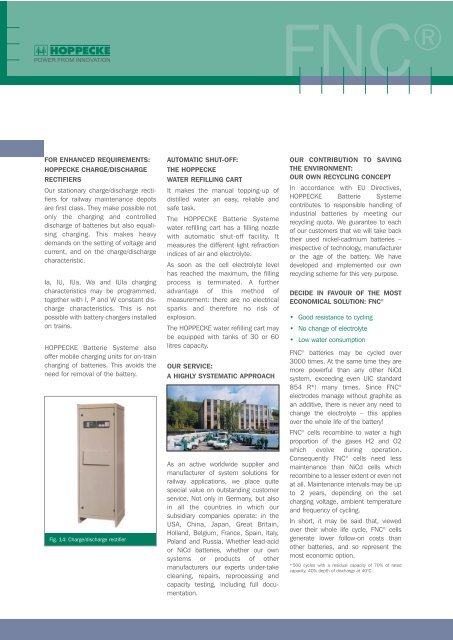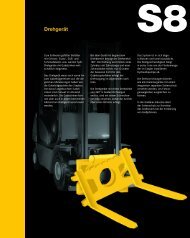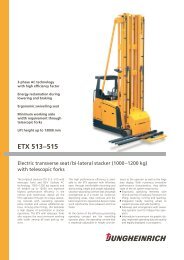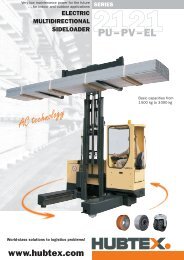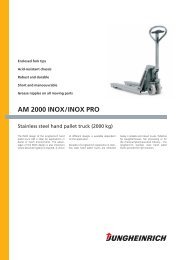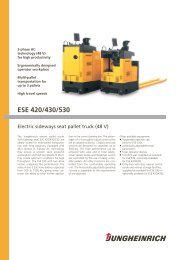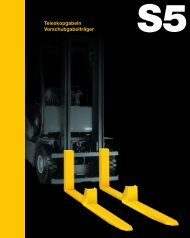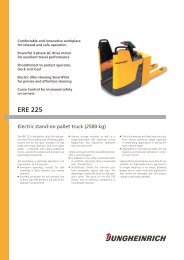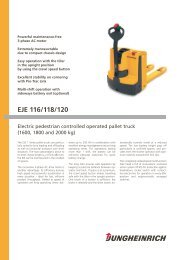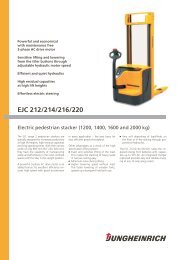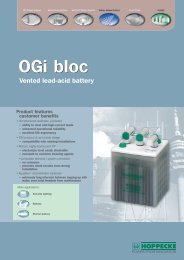FNC® Battery Systems for Rail Vehicles FNC ... - Gothi-bg.com
FNC® Battery Systems for Rail Vehicles FNC ... - Gothi-bg.com
FNC® Battery Systems for Rail Vehicles FNC ... - Gothi-bg.com
You also want an ePaper? Increase the reach of your titles
YUMPU automatically turns print PDFs into web optimized ePapers that Google loves.
<strong>FNC</strong> ®<br />
FOR ENHANCED REQUIREMENTS:<br />
HOPPECKE CHARGE/DISCHARGE<br />
RECTIFIERS<br />
Our stationary charge/discharge rectifiers<br />
<strong>for</strong> railway maintenance depots<br />
are first class. They make possible not<br />
only the charging and controlled<br />
discharge of batteries but also equalising<br />
charging. This makes heavy<br />
demands on the setting of voltage and<br />
current, and on the charge/discharge<br />
characteristic.<br />
Ia, IU, IUa, Wa and IUIa charging<br />
characteristics may be programmed,<br />
together with I, P and W constant discharge<br />
characteristics. This is not<br />
possible with battery chargers installed<br />
on trains.<br />
HOPPECKE Batterie Systeme also<br />
offer mobile charging units <strong>for</strong> on-train<br />
charging of batteries. This avoids the<br />
need <strong>for</strong> removal of the battery.<br />
Fig. 14: Charge/discharge rectifier<br />
AUTOMATIC SHUT-OFF:<br />
THE HOPPECKE<br />
WATER REFILLING CART<br />
It makes the manual topping-up of<br />
distilled water an easy, reliable and<br />
safe task.<br />
The HOPPECKE Batterie Systeme<br />
water refilling cart has a filling nozzle<br />
with automatic shut-off facility. It<br />
measures the different light refraction<br />
indices of air and electrolyte.<br />
As soon as the cell electrolyte level<br />
has reached the maximum, the filling<br />
process is terminated. A further<br />
advantage of this method of<br />
measurement: there are no electrical<br />
sparks and there<strong>for</strong>e no risk of<br />
explosion.<br />
The HOPPECKE water refilling cart may<br />
be equipped with tanks of 30 or 60<br />
litres capacity.<br />
OUR SERVICE:<br />
A HIGHLY SYSTEMATIC APPROACH<br />
As an active worldwide supplier and<br />
manufacturer of system solutions <strong>for</strong><br />
railway applications, we place quite<br />
special value on outstanding customer<br />
service. Not only in Germany, but also<br />
in all the countries in which our<br />
subsidiary <strong>com</strong>panies operate: in the<br />
USA, China, Japan, Great Britain,<br />
Holland, Belgium, France, Spain, Italy,<br />
Poland and Russia. Whether lead-acid<br />
or NiCd batteries, whether our own<br />
systems or products of other<br />
manufacturers our experts under-take<br />
cleaning, repairs, reprocessing and<br />
capacity testing, including full documentation.<br />
OUR CONTRIBUTION TO SAVING<br />
THE ENVIRONMENT:<br />
OUR OWN RECYCLING CONCEPT<br />
In accordance with EU Directives,<br />
HOPPECKE Batterie Systeme<br />
contributes to responsible handling of<br />
industrial batteries by meeting our<br />
recycling quota. We guarantee to each<br />
of our customers that we will take back<br />
their used nickel-cadmium batteries –<br />
irrespective of technology, manufacturer<br />
or the age of the battery. We have<br />
developed and implemented our own<br />
recycling scheme <strong>for</strong> this very purpose.<br />
DECIDE IN FAVOUR OF THE MOST<br />
ECONOMICAL SOLUTION: <strong>FNC</strong> ®<br />
• Good resistance to cycling<br />
• No change of electrolyte<br />
• Low water consumption<br />
<strong>FNC</strong> ® batteries may be cycled over<br />
3000 times. At the same time they are<br />
more powerful than any other NiCd<br />
system, exceeding even UIC standard<br />
854 R*) many times. Since <strong>FNC</strong> ®<br />
electrodes manage without graphite as<br />
an additive, there is never any need to<br />
change the electrolyte – this applies<br />
over the whole life of the battery!<br />
<strong>FNC</strong> ® cells re<strong>com</strong>bine to water a high<br />
proportion of the gases H2 and O2<br />
which evolve during operation.<br />
Consequently <strong>FNC</strong> ® cells need less<br />
maintenance than NiCd cells which<br />
re<strong>com</strong>bine to a lesser extent or even not<br />
at all. Maintenance intervals may be up<br />
to 2 years, depending on the set<br />
charging voltage, ambient temperature<br />
and frequency of cycling.<br />
In short, it may be said that, viewed<br />
over their whole life cycle, <strong>FNC</strong> ® cells<br />
generate lower follow-on costs than<br />
other batteries, and so represent the<br />
most economic option.<br />
* 500 cycles with a residual capacity of 70% of rated<br />
capacity, 40% depth of discharge at 40°C.


